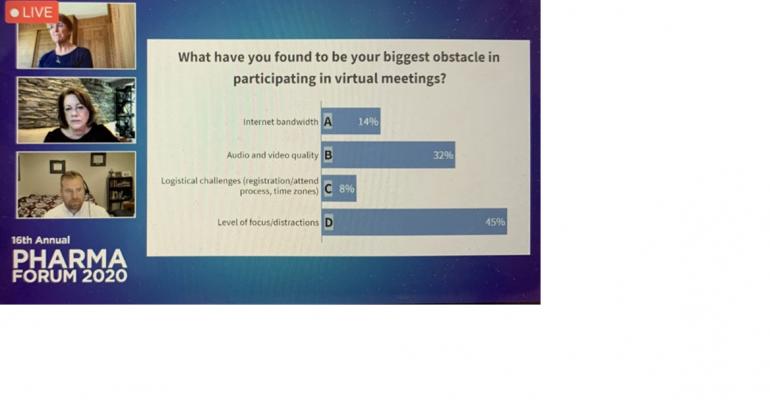During the 17th annual Pharma Forum conference for medical-event planners, held virtually this year from June 15-19, one real-time attendee survey result was a bit startling: 39 percent of the audience had never coordinated a virtual event prior to the travel shutdown stemming from the COVID-19 pandemic.
Of course, that figure will be much closer to zero by the end of 2020. But that doesn’t mean all the medical events moving from in-person to online will be done well.
For planners who have not yet had much experience with virtual events, “consulting with your internal IT people and outside vendors is so important in the beginning,” said Isabelle Gordon, HMCC, head of U.S. meeting & convention management for Bayer, during a Pharma Forum session titled “The Power of Virtual Meetings.”
Susan Lejeune, vice president of operations for Maritz Global Events, explained why: “Some meetings are fine using a basic platform like Zoom, but others need something more robust.” Key questions to consider: What is the audience demographic, and where are attendees in the learning process for this topic? Do they need a lecture with polling and gamification and preproduced video segments, or do they need to interact more deeply in smaller groups?
Furthermore, Gordon said that “IT people and production staff have to know whether attendees will be assigned to virtual breakout rooms or can choose on the spot which ones to go into,” and maybe even move in and out of a few sessions during a given time slot.
For HCP-facing virtual events, Bayer partners with MedPoint Digital, which provides the tech platform and also tracks HCPs’ log-on and log-off times, whether their connection is intact, and other real-time data. (Bayer uses Cvent for registration, but internally tracks HCPs’ fee-for-service payment information.) Tim Curry, director of global development for MedPoint Digital, told the Pharma Forum audience that for both presenters and attendees, “connecting their audio through a laptop can be challenging. Home internet signals can get sketchy, especially for evening sessions where HCPs are competing with their family for bandwidth. Everyone can maintain a more consistent connection over the phone; even if the video buffers a bit, attendees aren’t missing out on content.”
Also, it is important to train presenters, advisory board members, and others who will interact frequently during a session. “Prepare everyone not only for success with all the technology features, but as a meeting leader or contributor,” says Curry. “Have presenter rehearsals so that they get the lighting, background, camera angle, and audio levels correct, and can quickly activate their backup audio connection.”

Other important tips for hosting effective virtual meetings:
• Content and attendee recruitment require the most time, not the event’s technical setup, said Gordon.
• “The project manager needs a checklist for the whole process, from registration to production to execution to follow-up,” said Maritz’s Lejeune.
• With scheduling, “break up longer meetings across a few days, with a shorter number of hours per day,” Curry said. “Three hours online is more tedious than three hours in person.”
• “Build in engagement opportunities or at least change the format every 10 to 12 minutes,” Curry said, “and provide more frequent breaks too.”
• Have a detailed “know before you connect” email or web page for attendees. This way, “people are more comfortable right from the start, and you get many fewer questions before and during the session,” said Curry.
• Plan out troubleshooting processes in order to minimize downtime if a session glitches.
• Send GrubHub or DoorDash vouchers to attendees so they can eat during or between sessions, Gordon suggested.
• “It is endearing to occasionally hear or see a child or a pet in the background,” said Gordon. “On the other hand, hearing someone unload their dishwasher is not endearing. Remind people of this.”





